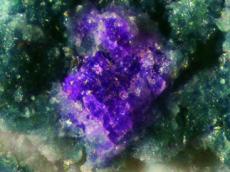|
|
TODAY.AZ / Weird / Interesting
Unique mineral discovered in Australia
24 April 2014 [13:50] - TODAY.AZ
 A previously unknown mineral has been discovered in a remote location in Western Australia. The mineral, named putnisite, appears purple and translucent, and contains strontium, calcium, chromium, sulphur, carbon, oxygen and hydrogen, a very unusual combination.
A previously unknown mineral has been discovered in a remote location in Western Australia. The mineral, named putnisite, appears purple and translucent, and contains strontium, calcium, chromium, sulphur, carbon, oxygen and hydrogen, a very unusual combination.While dozens of new minerals are discovered each year, it is rare to find one that is unrelated to already-known substances. "Most minerals belong to a family or small group of related minerals, or if they aren't related to other minerals they often are to a synthetic compound--but putnisite is completely unique and unrelated to anything," said Peter Elliott, co-author of a study describing the new substance and a researcher at the South Australian Museum and the University of Adelaide, in a statement. "Nature seems to be far cleverer at dreaming up new chemicals than any researcher in a laboratory."
It appears as tiny semi-cubic crystals and is often found within quartz. Putnisite is relatively soft, with a Mohs hardness of 1.5 to 2 (out of 10), comparable to gypsum, and brittle. It's unclear yet if the mineral could have any commercial applications.
Putnisite was discovered during prospecting for a mine at Lake Cowan in southwestern Australia, and is named after mineralogists Andrew and Christine Putnis. Mineral names are usually proposed by the discoverer, as in this case, but must be approved by the International Mineralogical Association.
/Popsci/
URL: http://www.today.az/news/interesting/132999.html
 Print version
Print version
Views: 2522
Connect with us. Get latest news and updates.
See Also
- 19 February 2025 [22:20]
Visa and Mastercard can return to Russia, but with restrictions - 05 February 2025 [19:41]
Japan plans to negotiate with Trump to increase LNG imports from United States - 23 January 2025 [23:20]
Dubai once again named cleanest city in the world - 06 December 2024 [22:20]
Are scented candles harmful to health? - 23 November 2024 [14:11]
Magnitude 4.5 earthquake hits Azerbaijan's Lachin - 20 November 2024 [23:30]
Launch vehicle with prototype of Starship made its sixth test flight - 27 October 2024 [09:00]
Fuel prices expected to rise in Sweden - 24 October 2024 [19:14]
Turkiye strikes terror targets in Iraq and Syria - 23 October 2024 [23:46]
Kazakhstan supplied almost entire volume of oil planned for 2024 to Germany in 9 months - 23 October 2024 [22:17]
Taiwan reported passage of Chinese Navy aircraft carrier near island
Most Popular
 President Erdo?an addresses global order, regional stability at 16th Ambassadors Conference
President Erdo?an addresses global order, regional stability at 16th Ambassadors Conference
 Pashinyan calls for restoration of railway links as Azerbaijani fuel shipment heads to Armenia
Pashinyan calls for restoration of railway links as Azerbaijani fuel shipment heads to Armenia
 Cotton cultivation boom links tradition with modern value-chain growth
Cotton cultivation boom links tradition with modern value-chain growth
 Azerbaijan, Netherlands highlight positive momentum in political relations
Azerbaijan, Netherlands highlight positive momentum in political relations
 Prosecutor demands life imprisonment for accused war criminal
Prosecutor demands life imprisonment for accused war criminal
 President Ilham Aliyev meets with President of United Arab Emirates in Abu Dhabi
President Ilham Aliyev meets with President of United Arab Emirates in Abu Dhabi
 Turkiye's First Lady highlights women’s role in peacebuilding and climate action
Turkiye's First Lady highlights women’s role in peacebuilding and climate action
